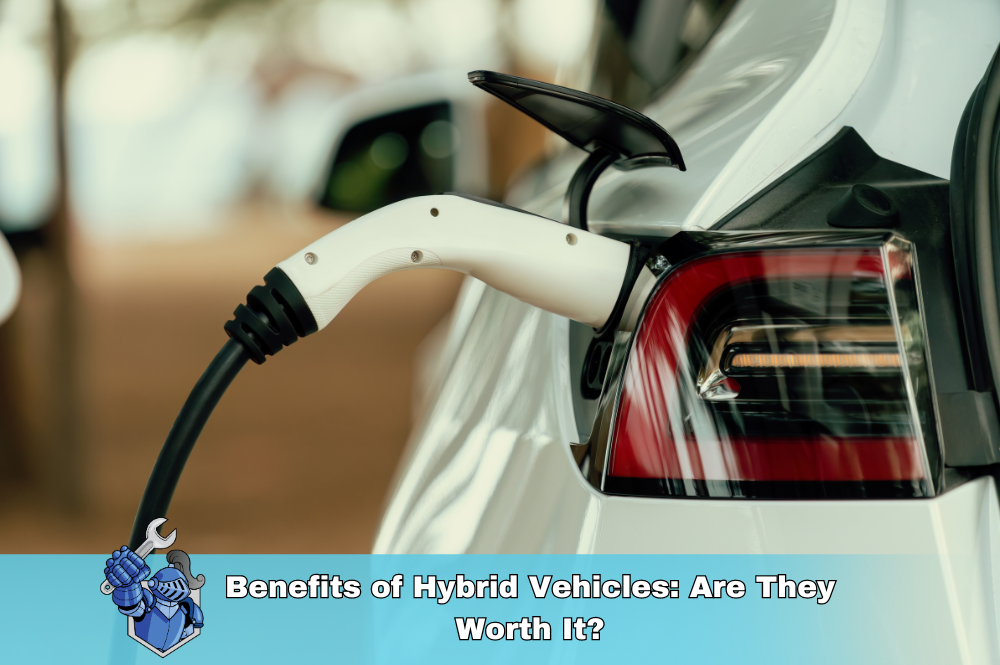As the world increasingly prioritizes environmental sustainability and energy efficiency, hybrid vehicles have become a popular choice among consumers. But are they worth the investment? In this comprehensive guide, we will explore the numerous benefits of hybrid vehicles, from fuel efficiency to reduced emissions, and help you decide if a hybrid vehicle is the right choice for you.
What is a Hybrid Vehicle?
A hybrid vehicle combines a traditional internal combustion engine with an electric motor and battery. The most common type is the parallel hybrid, where both the electric motor and the internal combustion engine can drive the car independently or simultaneously. Series hybrids and plug-in hybrids (PHEVs) are other variations, each with its unique advantages.
1. Fuel Efficiency
One of the primary benefits of hybrid vehicles is their superior fuel efficiency compared to conventional gasoline-powered cars. By utilizing an electric motor alongside the internal combustion engine, hybrids can significantly reduce fuel consumption. This not only saves you money at the pump but also extends the range of the vehicle, making it ideal for long commutes and road trips.
How it Works
Hybrid vehicles typically use regenerative braking to recharge the battery. When you apply the brakes, the kinetic energy that would normally be lost as heat is captured and converted into electrical energy. This energy is then stored in the battery and used to power the electric motor, reducing the reliance on the gasoline engine and improving fuel economy.
Real-World Savings
According to the U.S. Department of Energy, hybrid vehicles can improve fuel economy by 20-35% compared to similar gasoline-powered vehicles. For example, the Toyota Prius, one of the most popular hybrids, averages around 54 miles per gallon (mpg) in combined city and highway driving, compared to 30 mpg for a comparable non-hybrid vehicle.
2. Environmental Benefits
Reducing greenhouse gas emissions is a critical aspect of combating climate change, and hybrid vehicles play a significant role in this effort. By using less fuel and emitting fewer pollutants, hybrids help to lower the overall carbon footprint of driving.
Lower Emissions
Hybrid vehicles produce fewer tailpipe emissions than conventional vehicles. The combination of electric power and improved fuel efficiency results in reduced carbon dioxide (CO2), nitrogen oxides (NOx), and particulate matter emissions. This is particularly important in urban areas, where air quality is a significant concern.
Contribution to Sustainability
Driving a hybrid vehicle is a step towards a more sustainable future. By choosing a hybrid, you are supporting the transition to cleaner, renewable energy sources and reducing dependence on fossil fuels. Many hybrid vehicles are also designed with eco-friendly materials and manufacturing processes, further contributing to environmental sustainability.
3. Financial Incentives
In addition to fuel savings, hybrid vehicles often come with financial incentives that can make them a more attractive option.
Tax Credits and Rebates
Many governments offer tax credits and rebates to encourage the adoption of hybrid and electric vehicles. In the United States, for example, federal tax credits for plug-in hybrid vehicles can be as much as $7,500, depending on the battery capacity. Some states also offer additional incentives, such as rebates, reduced registration fees, and access to HOV lanes.
Lower Operating Costs
Hybrid vehicles typically have lower maintenance costs than conventional vehicles. The regenerative braking system reduces wear and tear on the brake pads, and the electric motor takes some of the load off the internal combustion engine, leading to less frequent oil changes and other engine maintenance. Over time, these savings can add up, making hybrid vehicles more economical to own and operate.
4. Performance and Driving Experience
Modern hybrid vehicles are designed to provide a smooth and enjoyable driving experience. Advances in technology have addressed many of the performance concerns that early hybrids faced.
Smooth and Quiet Operation
Hybrid vehicles are known for their quiet operation, particularly at low speeds when running on electric power alone. This makes for a more pleasant and less stressful driving experience, especially in stop-and-go traffic.
Instant Torque
Electric motors deliver instant torque, which means hybrid vehicles can accelerate quickly and smoothly from a stop. This provides a responsive driving experience and makes merging onto highways or passing other vehicles easier and safer.
5. Technological Innovation
Hybrid vehicles often come equipped with the latest technological advancements, providing additional benefits and enhancing the overall driving experience.
Advanced Safety Features
Many hybrid vehicles include advanced safety features such as adaptive cruise control, lane-keeping assist, automatic emergency braking, and more. These features not only improve safety but also add to the convenience and ease of driving.
Connectivity and Infotainment
Hybrid vehicles are often at the forefront of in-car technology, offering state-of-the-art infotainment systems, smartphone integration, and other connectivity features. This ensures that drivers have access to the latest conveniences and can stay connected while on the road.
Are Hybrid Vehicles Worth It?
When considering whether a hybrid vehicle is worth the investment, it's essential to weigh the initial cost against the long-term benefits. While hybrids may have a higher upfront price compared to conventional vehicles, the savings on fuel, maintenance, and potential financial incentives can offset this cost over time.
Resale Value
Hybrid vehicles tend to hold their value well, thanks to their fuel efficiency and growing demand for environmentally friendly transportation options. This can result in a higher resale value compared to conventional vehicles, providing additional financial benefits.
Future-Proofing
As regulations on vehicle emissions become stricter and fossil fuel prices continue to fluctuate, owning a hybrid vehicle can be seen as future-proofing your transportation needs. Hybrids offer a practical and sustainable solution that aligns with the global shift towards greener energy sources.
Protecting Your Investment with NobleQuote
Investing in a hybrid vehicle is a smart choice, but it's also important to protect that investment with a reliable car warranty. Hybrid vehicles come with advanced technology and components that can be expensive to repair or replace. That's where NobleQuote comes in.
Extended Warranty Coverage
NobleQuote offers comprehensive extended warranty plans for hybrid vehicles, providing coverage for critical components such as the battery, electric motor, and hybrid system. Our plans include:
- Diamond Plan: The best protection offered, similar to the factory warranty. It is an exclusionary policy with a short list of non-covered items such as routine maintenance and wear and tear.
- Elite Plan: Extensive coverage for major components, including premium components like electronics, suspension, steering, air conditioner, and factory GPS.
- Premier Plan: Upgraded coverage with premium benefits, covering motor, transmission, drive axle, transfer case, air conditioning, electrical, water pump, alternator, starter, radiator, fuel delivery system, fuel injectors, fuel pump, and steering.
- Powertrain Plan: Basic coverage with premium benefits, covering motor, transmission, drive axle, and transfer case.
Benefits of NobleQuote Coverage
- 24-Hour Roadside Assistance: Get help when you need it, no matter the time of day.
- Towing Services: Avoid the hassle and cost of towing with included coverage.
- Rental Car Coverage: Stay on the move with rental car reimbursement while your vehicle is being repaired.
- Routine Maintenance Reimbursement: Keep up with regular maintenance without breaking the bank.
Why Choose NobleQuote?
At NobleQuote, we understand the importance of having peace of mind when it comes to your vehicle. Our extended warranty quotes are competitive, and our coverage plans are designed to meet the needs of hybrid vehicle owners. Whether you have a new or used car, getting a car warranty quote from NobleQuote ensures that you are protected from unexpected repair costs.
For more information on our coverage plans and to get an extended warranty quote, visit our NobleQuote Learning Center.
Conclusion
Hybrid vehicles offer numerous benefits, including improved fuel efficiency, reduced environmental impact, financial incentives, and a superior driving experience. While the initial cost may be higher, the long-term savings and positive contributions to sustainability make hybrids a worthwhile investment for many drivers.
By choosing a hybrid vehicle and protecting it with a NobleQuote extended warranty, you are not only making a smart financial decision but also contributing to a healthier planet. With their numerous benefits and growing popularity, hybrids are indeed worth considering for your next vehicle purchase.
For more information on hybrid vehicles and other automotive topics, visit our NobleQuote Learning Center.
Frequently Asked Questions (FAQ)
Q: How does a hybrid vehicle save on fuel costs?
A: Hybrid vehicles combine an internal combustion engine with an electric motor, using regenerative braking to capture energy and reduce fuel consumption, leading to significant savings at the pump.
Q: Are hybrid vehicles more expensive to maintain?
A: No, hybrid vehicles often have lower maintenance costs due to reduced wear on the engine and brakes, thanks to the electric motor and regenerative braking system.
Q: Do hybrid vehicles qualify for tax credits or rebates?
A: Yes, many governments offer tax credits and rebates for hybrid and electric vehicles, which can help offset the higher initial purchase price.
Q: What are the environmental benefits of driving a hybrid vehicle?
A: Hybrid vehicles produce fewer emissions, reducing the overall carbon footprint and contributing to improved air quality, especially in urban areas.
Q: Can hybrid vehicles perform well on highways?
A: Yes, modern hybrid vehicles are designed to provide excellent performance, with instant torque from the electric motor and smooth acceleration, making them suitable for highway driving.
Q: How long do the batteries in hybrid vehicles last?
A: The batteries in hybrid vehicles are designed to last for many years, often with warranties covering up to 8 years or 100,000 miles, ensuring reliability and peace of mind.
Q: Are hybrid vehicles suitable for long-distance driving?
A: Absolutely. Hybrid vehicles offer extended range and improved fuel efficiency, making them ideal for long commutes and road trips.
Q: Why should I get an extended warranty for my hybrid vehicle?
A: An extended warranty provides peace of mind by covering the cost of repairs for critical components. With advanced technology in hybrid vehicles, repairs can be costly. An extended warranty from NobleQuote ensures you are protected from unexpected expenses.
Suggestions for you
Read MoreLet’s work together
Every week we showcase three charitable organizations that our donations are sent to. Our clients are able to choose which of these three will receive their gift when they add coverage to their vehicle...




